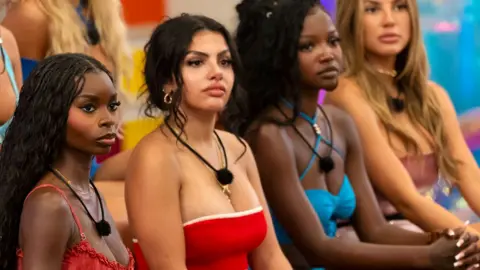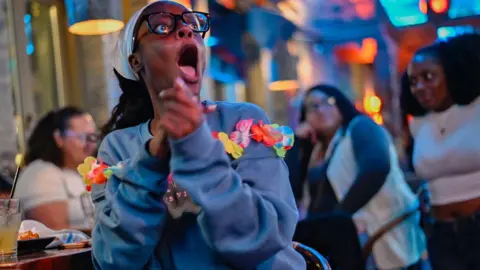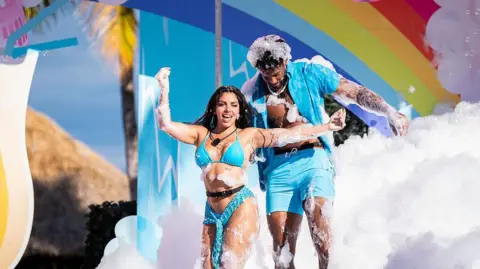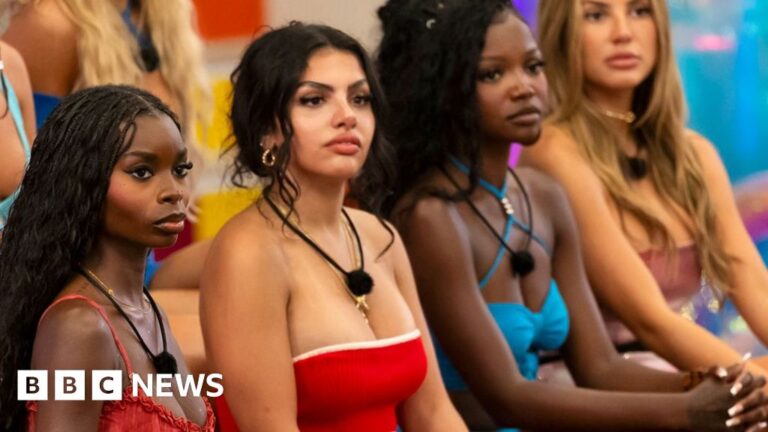BBC News
 Peacock via Getty Images
Peacock via Getty ImagesCommitted Nigerian fans of the reality dating show Love Island USA are all primed to watch the coming reunion of the couples six weeks after the Fiji finale.
“Nigerians love drama. We love ‘wahala’,” says 20-year-old Nigerian student Ashimi Olamiposi, using the Nigerian Pidgin word for trouble. And there is plenty of that in Love Island.
But the on-screen drama was also matched by off-screen tensions among some in the global fanbase.
Nigerian viewers were often caught in the crosshairs with some branding them “toxic” – and others wanting them to be banned from watching the show.
This all stemmed from accusations that some in Africa’s most-populous nation were trying to manipulate the outcome of the public vote as well as interfere with the social media accounts of some of the participants.
For the uninitiated, Love Island USA is the American spin-off of the hit British dating format. Contestants, dubbed “islanders”, couple up in a luxury villa in Fiji, navigating challenges, romantic entanglements and public votes under constant camera surveillance. The prize: $100,000 (£86,200) and possibly love.
This year the winners of Love Island USA were Amaya Espinal and Bryan Arenales, who paired up in the last week of the show – and are still together.
Ms Olamiposi is keen to distance herself from what she calls “insane” attempts to affect the outcome.
Nonetheless, her passion for the show is still apparent when she talks to the BBC from Lagos – a month after the finale.
There is excitement in her eyes, her blonde braids swing back and forth as she recollects villa drama, late-night group chats and fierce online skirmishes, like a war veteran sharing combat stories.
“Love Island USA” was tweeted about more than 2.1 million times during the season in Nigeria, peaking at 574,000 tweets in a one day on X – more than in South Africa or Ghana.
Nigerians can watch Love Island using a VPN, which makes it appear as if they are in the US, and then access the app from broadcaster Peacock or, like Ms Olamiposi, view episodes posted on YouTube by anonymous users.
 The Boston Globe via Getty Images
The Boston Globe via Getty ImagesMs Olamiposi, who had watched previous seasons of Love Island USA, says this year was different – mainly thanks to several TikTok videos of a particular islander: Huda Mustafa.
“I was like: ‘Who is this girl bawling her eyes out?'” she says with amusement – adding that she was one of the only islanders who “came for the right reason” and had “depth”.
The 24-year-old mother became one of the most talked-about contestants because of her polarising personality, public confrontations and complex relationships with fellow contestants.
Ms Olamiposi stumbled upon a WhatsApp group after she was trawling social media trying to find ways she could vote for her favourite islander, as people outside the US are not supposed to be able to participate.
The group she joined was co-founded by two people – one from the UK and the other in Nigeria.
Of the 200 people in the chat, about 150 were Nigerian, while the rest were from the US, Ghana, Kenya and the UK, Ms Olamiposi tells the BBC.
With military precision and determination, the well-oiled WhatsApp group pooled funds to buy American phone numbers so they could vote.
Donald Clarke, a London-based television producer who worked on the first series of Big Brother Nigeria and has two decades’ experience in African reality TV, is not surprised by this and the love Nigerians have for reality television.
“Nigeria has a huge story-telling culture. Nollywood is a symptom of that,” he says, referring to the country’s massive film industry.
“That drifts into reality TV and the way Nigerian viewers watch it. They’re heavily invested, and they express that heavily on social media.”
That investment, he explains, is amplified by social media.
“The shows spark conversations, they provoke topics of discussion and then the audience runs away with it. With social media and how it’s evolved into memes and shared moments, the conversation becomes as big as the show itself,” he says.
For Dr Wendy Osefo, a Nigerian-American sociology lecturer at Wesleyan University and cast member of the reality TV show Real Housewives of Potomac, Nigerians’ love for reality TV is linked to the West African country’s fraught political landscape.
“A lot of Nigerians politically have lived their life through the lens of being viewers,” she tells the BBC.
In a country that experienced military rule for several decades and has had allegations of disputed elections, Nigerians have felt little more than spectators, the 41-year-old explains.
“The biggest reality TV is our political system,” she says of Nigeria – adding this could also now be applied to the US.
Admittedly both worlds tend to have big personalities, alliances, betrayals and dramatic twists – in the legislature and the Love Island villa.
And like politics, the Love Island USA fan culture can get vicious, very quickly.
When asked to connect the BBC with more people in her WhatsApp group, Ms Olamiposi was reluctant – wary of potential spies there.
Some Love Island USA fans who support other islanders have infiltrated the group and leaked their conversations and strategies, she explained
“Wahala” then ensued over allegations that efforts were being made by the group to shut down some contestants’ social media accounts, which led to the “toxic” accusations.
One user on X said: “Please ban Love Island from Nigeria.” This has amassed close to 9,000 likes.
“There gotta be a way to ban the whole Nigeria from watching love island again next year,” another person in the US posted.
Someone in the UK tweeted: “Why is it always Nigerians with this toxic attitude towards TV shows?… Nigerians in Nigeria need to leave love island alone.”
Tensions between American and Nigerian fans often come down to their different perspectives, especially when it comes to identity, says Ms Olamiposi.
“Black Americans always make it about race whereas Nigerians don’t bother so much with that,” she says.
 Peacock via Getty Images
Peacock via Getty ImagesOn the show’s starting line-up, there were four girls alongside Huda Mustafa, who is of Arab heritage.
Chelley Bissainthe and Olandria Carthen were the only black female islanders in that initial line-up and faced a lot of racist comments. When other black women did not support them, some saw it as a betrayal.
Ms Olamiposi says she was dubbed “anti-black” because she supported Mustafa.
“I was bamboozled,” she says, her eyes wide with shock.
Dr Osefo says these cultural differences are rooted in distinct historical experiences.
“I think that when you come from a predominantly black nation, race is not something that’s at the forefront of your mind,” she says, explaining that black people in America do not have the luxury of thinking like that.
The Nigerian fandom is also shaped by the more colourful use of language, the academic says.
“There’s a saying that if you hear Nigerians talking, you’d think they’re arguing, because we’re so passionate.
“Even in how we instruct people. Your mum in the US might say: ‘You need to make your bed.’ A Nigerian mum might say: ‘Do you want to live your life as a pauper forever?’ It’s deeper and that passion translates to social media.”
For Mr Clarke this underlines how deeply reality TV has become embedded in Nigerian culture.
“It’s part of the fabric of society now. In its best form, reality TV reflects the audience and reflects the desires and hopes of the people that are watching it.”
Watch parties are expected – some virtually – for the viewing of the Love Island USA Reunion, due to stream later on Monday.
“I want everybody to ‘stand on business’, ’10 toes down’,” says Ms Olamiposi – using two catchphrases that went viral during this season’s Love Island USA.
In essence they convey the message: mean what you say and say what you mean.
If this happens, she, like most Nigerians, will be lapping up the “wahala”.
You may also be interested in:
 Getty Images/BBC
Getty Images/BBC

